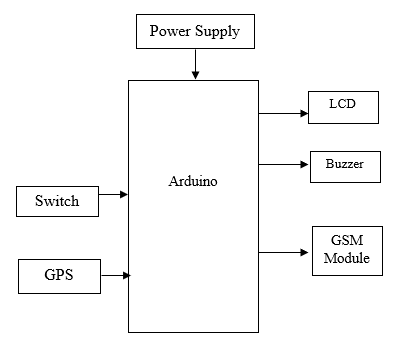An Emergency Message and Call System for People with Epilepsy
Objective
The main objective of this project is to send an immediate call and message which is useful for Epilepsy people
Abstract
People with epilepsy (PWE) always worry about mishaps that can happen to them due to seizure attacks if someone is not nearby. To overcome this, we have developed a novel alert system that can help caretakers to reach patients quickly. Emergency call is triggered through a Arduino- GSM module interface. The location details are conveyed to caretakers as google map link and address through call and message. The switch in the device work for sending manual alerts in case of emergency and as panic switch Then Buzzer will activate and the location of the person will send to the caretaker. After analyzing all the issues related to epilepsy, we proposed a plan to make a cheap and usable device as a solution so that an epileptic patient can move like a normal human being. With this device, if an epileptic patient falls ill anywhere, their information will be sent to the caretaker.
NOTE: Without the concern of our team, please don't submit to the college. This Abstract varies based on student requirements.
Block Diagram

Specifications
Hardware Requirements:
- Arduino
- GSM
- Switch
- LCD
- Buzzer
- GPS Module
- Battery
Software Requirements:
- Arduino IDE
- Embedded C
Learning Outcomes
- Arduino pin diagram and architecture
- How to install Arduino IDE software
- Setting up and installation procedure for Arduino
- Introduction to Arduino IDE
- Basic coding in Arduino IDE
- Working of GPS Module
- Interface GPS Module with Arduino?
- Interface Switch with Arduino?
- Working of GSM
- Interface GSM with Arduino?
- Working of Buzzer
- Interface Buzzer with Arduino?
- Working of LCD
- Interface LCD with Arduino?
- Working of power supply
- About Project Development Life Cycle:
- Planning and Requirement Gathering (software’s, Tools, Hardware components, etc.,)
- Schematic preparation
- Code development and debugging
- Hardware development and debugging
- Development of the Project and Output testing
- Practical exposure to:
- Hardware and software tools.
- Solution providing for real time problems.
- Working with team/ individual.
- Work on Creative ideas.
- Project development Skills
- Problem analyzing skills
- Problem solving skills
- Creativity and imaginary skills
- Programming skills
- Deployment
- Testing skills
- Debugging skills
- Project presentation skills
- Thesis writing skills





 Paper Publishing
Paper Publishing
